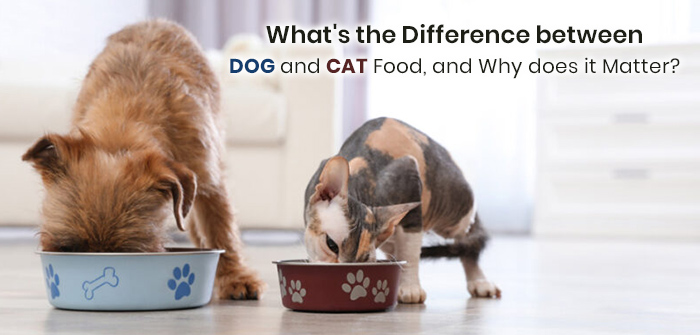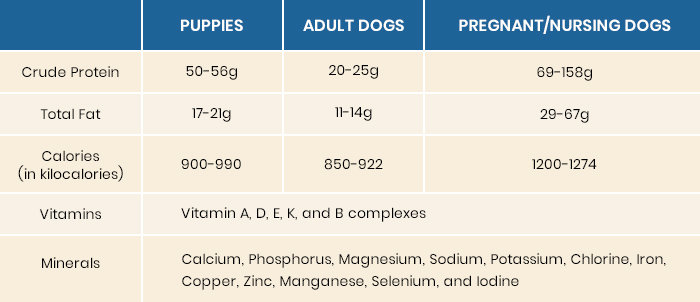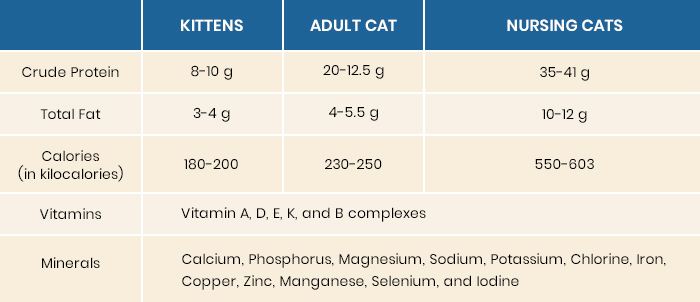What’s the Difference Between Dog and Cat Food, and Why does It Matter?
If you are a pet parent of both cats and dogs, you might have tried feeding them the same food at some point. This is especially true when you run out of pet-specific food. But, is it the right practice? In this blog, we are going to answer that for you. So, keep reading to learn more about your pet’s dietary needs and why it is important to feed them the right food.
To clarify, there is a reason cat food and dog foods are labelled differently. Both cats and dogs have different dietary needs, and feeding them inappropriate food can lead to nutritional deficiencies and health problems. Let’s discuss this topic in depth so that you can understand the importance of feeding your pet the appropriate diet.
Nutritional Differences between Dog and Cat Food
Biologically, cats and dogs are different species, which is why their nutritional needs would also differ. Cats are obligate carnivores, meaning they require a diet that is primarily made up of meat. On the other hand, dogs are omnivores and can tolerate a more varied diet that includes both meat and plant-based ingredients.
Nutritional Requirements of Dogs
Dogs require a wide range of nutrients to survive and thrive, which include carbohydrates, amino acids, fatty acids, protein, vitamins, minerals, other trace elements, and water. Moreover, their specific nutritional requirements and proportions depend on their breed, size, and stage of life.
The following chart gives a detailed breakdown of the nutritional requirements of dogs. All the numbers mentioned in the table show approximate values and the actual needs of nutrition may vary:
Studies suggest that an adult dog’s daily diet can comprise up to 50% of carbohydrates by weight, with 2.5–4.5% derived from fibre. It should also contain at least 10% protein and 5.5% fat. Additionally, pet parents must also consider the overall health and condition of their pets, as some health conditions may require specific dietary modifications.
Nutritional Requirements of Cats
Like dogs, a cat’s diet also comprises an array of nutrients, including amino acids from proteins, carbohydrates, fatty acids, vitamins, minerals, other trace elements, and water. These nutrients must be provided in the appropriate proportions to ensure optimal health and well-being for cats. Your cat’s breed, size, and life stage play a crucial role in deciding the right proportion of these nutrients.
The following chart gives a detailed breakdown of the approximate nutritional requirements of cats and the actual requirements of nutrition may vary:
Differences in Dog and Cat Food
At first, the nutritional requirements of dogs and cats may look the same based on the nutrients required for their growth and maintenance; however, their proportion varies greatly.
If compared by weight, cats require more protein than dogs. This is because cats are obligate carnivores and rely heavily on animal-based protein for their nutritional needs. Additionally, cat food is formulated to meet the specific dietary requirements for certain amino acids, vitamins, and minerals.
The following are a few important differences between dog and cat food:
- Cats require taurine, an amino acid, essential to maintain their healthy vision and heart function. This amino acid is not found in plants. Cats get this amino acid from animal meat.
- As cats do not have the enzyme to convert B-carotene to vitamin A, cat food contains preformed vitamin A, which is derived from animal sources. It is required for the maintenance of bones and muscles, vision, reproduction, and skin and coat health.
- Cats require 5 times more vitamin B1 (thiamine) than dogs, which can be found in higher amounts in cat food.
- Cat foods are rich in moisture content, as cats aren’t as responsive as other mammals and dogs to their instinct to feel thirsty or dehydrated.
- Additionally, cat food often includes omega-6 fatty acids. Dogs can fulfil their omega-6 fatty acid requirements through metabolism, while cats cannot. Therefore, cat food is formulated to provide the necessary omega-6 fatty acids for optimal health and well-being in cats.
- Last, the taste of cat and dog food varies greatly, as cats have fewer taste receptors than dogs. Therefore, cat food is often formulated with stronger flavours to entice cats to eat it. Because of this difference, cats rarely savour dog food.
Condition-specific diets and foods
Besides general differences in dog and cat food, it is important to consider the condition of your pet when choosing their diet. There are specific diets and foods available for pets with certain health conditions.
For example, there are diets designed for cats with urinary problems or dogs with dental problems. These are often called prescription diets and are specifically designed to meet the unique dietary needs of your pet, depending on their health conditions.
Feeding such dog food to cats, or vice versa, can lead to severe health problems for your pets. It can also be fatal, as pets have different levels of tolerance for nutrients. For example, cats can tolerate high amounts of vitamin D, while dogs may fall sick or experience toxicity if given the same dosage.
Therefore, it is important to consult with a veterinarian before changing your pet’s diet, as they can provide guidance on the best food options based on their specific health conditions or special needs.
Tips for Providing the Right Nutrition to Your Pet
As a pet parent, your responsibility for your pet goes beyond feeding them regular meals. It is important to provide a balanced diet for your pet. A balanced diet can ensure that your pet receives all the essential nutrients required for the growth and maintenance of their physical and overall wellbeing. Here are some general tips for feeding your pet:
- Choose a high-quality pet food that meets your pets’ specific needs depending on their age, breed, size, and activity level.
- Follow the feeding guidelines on the pet food label and adjust them according to your pet’s appetite and body condition.
- Avoid overfeeding your pet, as obesity can lead to various health problems, such as diabetes, arthritis, and heart disease.
- Provide fresh water for your pet at all times.
- Avoid giving them human food, especially chocolate, grapes, onions, garlic, etc.
- Ensure your pet exercises regularly. Provide them with mental stimulation to keep them fit, happy and healthy.
The following are a few reputed brands for balanced and prescription diets for pets that can help you ensure you are providing the right nutrition to your pet
The Best Brands for Dog Diets
- Hill’s Prescription Diet – Make your pets eat this food after your vet’s consultation to maintain their good health
- Royal Canin – Hypro Premium is a leading brand in super premium dog food. Made with real ingredients, the range of Hypro Premium dog food is finely crafted and wonderfully balanced.
- Balanced Life – Balanced life is a brand that provides air dried raw food and treats that enriches dogs and cats with all the natural and nutritious diet.
- Advance – Made up of high quality ingredients, some of the Advance food products are designed for care of specific organs while others helps in overall wellbeing of the pet.
- Ivory Coat – Made in Australia, Ivory Coat brand collection offers quality dog and cat food that are both nutritiously rich and delicious.
- Black Hawk – Looking for Australian made pet food? Black Hawk is the best option. Shop from our exclusive range of Black Hawk Holistic and Grain-free food for dogs, cats, puppies and kittens
The Best Brands for Cat Diets
- Dine – Dine brand range of delicious food is designed by cat lovers and stands to be the world’s finest cat foods. Dine varieties are made with the careful selection of ingredients.
- Hill’s Prescription Diet – Hill’s prescription diet is perfect for such conditions in pets. Make your pets eat this food after your vet’s consultation to maintain their good health.
- Purina Pro Plan – ProPlan is a high-quality food for dogs and cats. With a huge variety of ProPlan food products on our display, select from adult dog food to special health condition pet food.
- Advance – Nutritionally rich, these foods benefit the pet’s health in various areas including skin and coat health, oral health, digestive function, cellular repair, joint care and more.
- Ivory Coat – Ivory Coat is a popular brand in Australia for food items. Ivory Coat provides a huge collection of pet food for dogs and cats.
Bottom Line: Your Pet Deserves More Than Just Food!
If your dog eats cat food or vice versa, this practice is not recommended. Dogs and cats have different nutritional needs, and feeding them the wrong type of food can lead to various health problems. It is important to consult with a veterinarian to ensure that your pet is receiving the appropriate diet for their specific needs.




